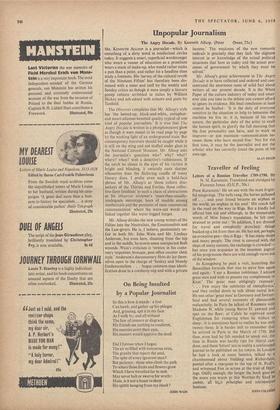Unpopular Journalism
The Angry Decade. By Kenneth Allsop. (Peter Owen, Ms.) MR. KENNETH ALLSOP is a journalist—which is something of a dirty word in intellectual circles today. It suggests a smart, superficial wordmonger who wears a veneer of education as a prostitute wears a mask of make-up, who would rather make a pun than a point, and rather hit a headline than study a footnote. His 'survey of the cultural revolt of the Nineteen Fifties' has therefore been dis- missed with a sneer and sniff by the weekly and Sunday critics as though it were simply a literary gossip column scribbled in italics by William Hickey and sub-edited with scissors and paste by Tanfield.
The Observer complains that Mr. Allsop's style has 'the hotted-up, black-and-white, metaphor- and smart-allusion-besotted quality typical of one kind of popular journalism.' It is true that The Angry Decade is written in a phosphorescent glow as though it were meant to be read page by page by the winking light of an underground train. But contemporary literature should be caught while it is still on the wing and not stuffed under glass in the National Cultural Museum. Mr. Allsop asks the journalist's questions who? why? what? where? when? with a detective's ruthlessness. If the torch he shines in the eyes of his victims is bright and blinding, it certainly casts sharper silhouettes than the flickering candle of many literary dons. I prefer even such a bold-face phrase of Mr. Allsop's as 'those culture disc- jockeys of the Thirties and Forties, those collec- tive-farm fetishists' to such a chain of abstractions as his Observer reviewer's 'more-than-usually- inadequate stereotype, born of muddle among intellectuals and the pressures of mass commercial communication' where the worn-out words are linked together like water-logged barges.
Mr. Allsop divides the new young writers of the Fifties into the Neutralists, the Emotionalists and the Law-givers. He is, I believe, passionately un- fair to both Mr. John Wain and Mr. Lindsay Anderson, but even here, shooting from the hip and in the saddle, he scores some unexpected flesh wounds. Wain's criticism is 'written in his custo- mary impatient, brusque, post office counter clerk style.' Anderson's documentary films do lay them- selves open to the charge of 'Sankey and Moody fundamentalism . . . bogus common-man identi- fication done in a corduroy cap and with a private
income.' The weakness of the new romantic radicals is precisely that they lack 'the slightest interest in or knowledge of the actual political situations that hem us today and the actual pro- cesses of government by which they must be solved.'
Mr. Allsop's great achievement in The Angry Decade is to have collected and ordered and con- centrated the enormous mass of solid fact about writers of our present decade. It is the White Paper of the culture industry of today and what- ever side you take in the debate you cannot afford to ignore its evidence. His final conclusion at least cannot be faulted : 'It is the duty of everyone sensitive to the situation to help to humanise the machine we live in; it is, because of his own nature, the particular duty of the artist to exalt the human spirit, to glorify the full meaning that the free personality can have, and to work to improve—or just maintain—communication be- tween those who have stayed free.' Not for the first time, it may be the journalist and not the scholar who has correctly timed the pulse of his own age.
ALAN BRIEN










































 Previous page
Previous page